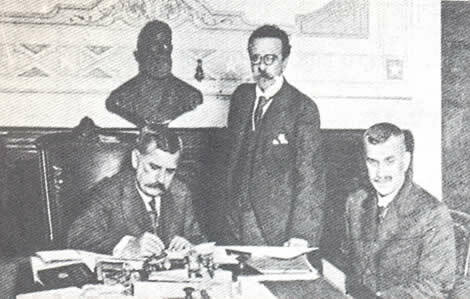Venceslau Brás he was the ninth President of the Brazilian Republic, ruling from 1914 to 1918, elected to replace Hermes da Fonseca as the candidate of consensus between the elites of São Paulo and Minas Gerais, who were aligned in the Partido Republicano Paulista and the Partido Republicano Mineiro, respectively. Venceslau Brás was one of the presidents of the café au lait policy, characteristic of the Old Republic.

Venceslau Brás declaring war on Germany, accompanied by Nilo Peçanha (standing) and Delfim Moreira (sitting)
His government was marked by some interesting facts that took place in Brazil. In 1916, Venceslau Brás sanctioned the first Brazilian Civil Code, approved by Congress in 1915. It was under the command of Venceslau Brás that Brazil also decided to enter World War I, after Brazilian ships were sunk by the German navy. However, Brazilian participation in the conflict was restricted to sending a corps of doctors and an expeditionary group to patrol part of the African coast and the North Atlantic.
But within the country's borders, Venceslau Brás had to face social conflicts more intensely. The first was the Contestado War, a conflict that took place in the border territory between the states of Paraná and Santa Catarina, between 1912 and 1915. The conflicted area was disputed by the two states, due to the use of the forest and the plantations of yerba mate. It was also inhabited by workers who built the railroad linking São Paulo to Rio Grande do Sul, who remained there after construction. Led by the “monk” José Maria and after several battles, the members of the “Milícia da Monarquia Celeste” were defeated by the forces of the Brazilian army in 1915.
Do not stop now... There's more after the advertising ;)
The second conflict was the workers' strikes that reached their peak in 1917, in the city of São Paulo. With an accelerated industrialization process due to market supply difficulties world, during the First World War, Brazil saw the increase in the number of workers among its population. Strongly influenced by anarchism, Brazilian workers had already been carrying out several strikes since the beginning of the century. However, in 1917, the city of São Paulo saw the outbreak of a general strike that was harsh. repressed, causing the death of a worker whose burial paralyzed the city and turned it into a field of battle.
Another fact that can be mentioned about the government of Venceslau Brás was the emergence of Spanish flu in Brazil, which caused the death of 15,000 people. Venceslau Brás was replaced in the presidency by Delfim Moreira, in 1918.
By Tales Pinto
Graduated in History
Would you like to reference this text in a school or academic work? Look:
PINTO, Tales dos Santos. "The government of Venceslau Brás"; Brazil School. Available in: https://brasilescola.uol.com.br/historiab/venceslau-bras.htm. Accessed on June 28, 2021.
